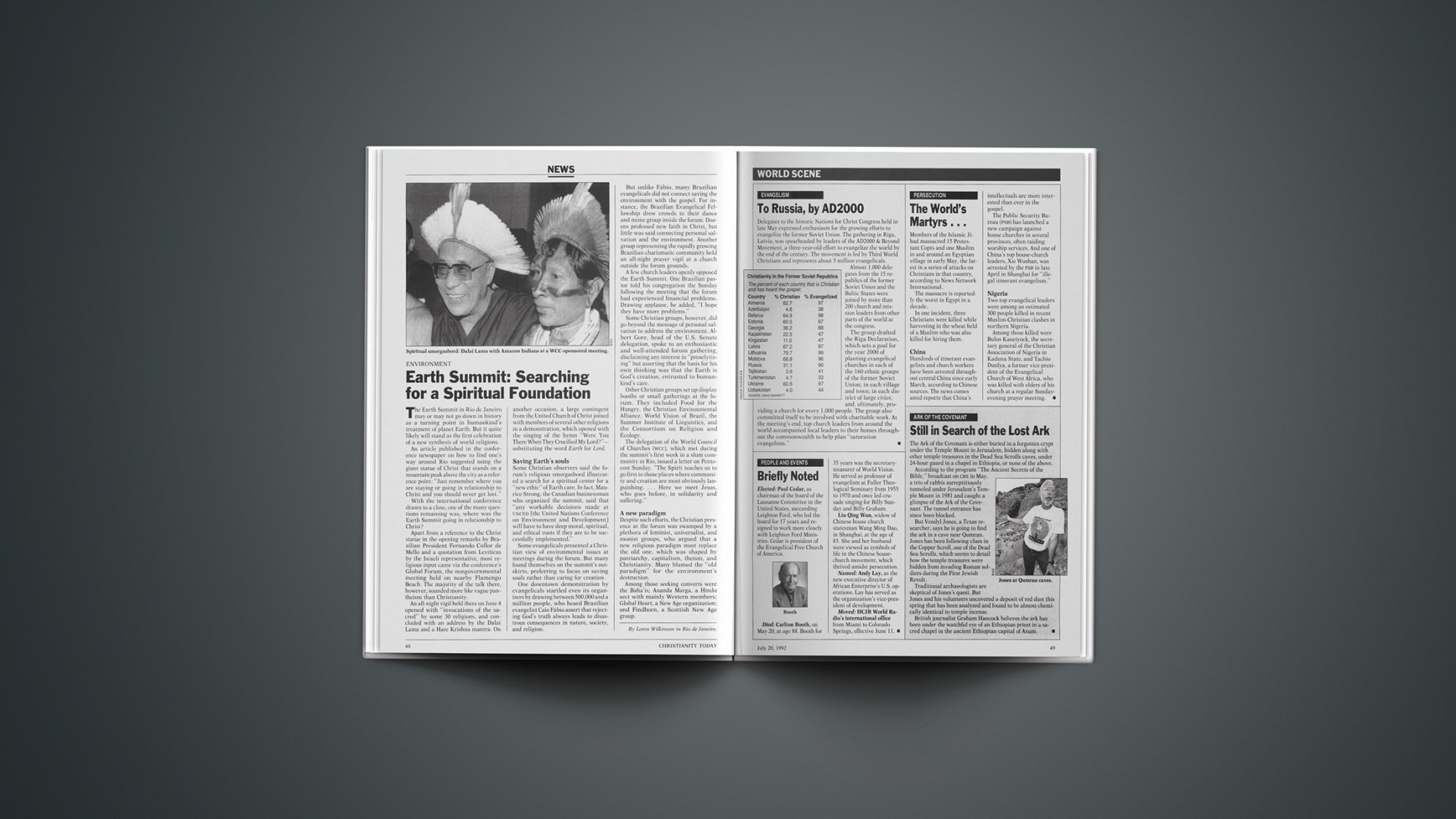The Earth Summit in Rio de Janeiro may or may not go down in history as a turning point in humankind’s treatment of planet Earth. But it quite likely will stand as the first celebration of a new synthesis of world religions.
An article published in the conference newspaper on how to find one’s way around Rio suggested using the giant statue of Christ that stands on a mountain peak above the city as a reference point: “Just remember where you are staying or going in relationship to Christ and you should never get lost.” With the international conference drawn to a close, one of the many questions remaining was, where was the Earth Summit going in relationship to Christ?
Apart from a reference to the Christ statue in the opening remarks by Brazilian President Fernando Collor de Mello and a quotation from Leviticus by the Israeli representative, most religious input came via the conference’s Global Forum, the nongovernmental meeting held on nearby Flamengo Beach. The majority of the talk there, however, sounded more like vague pantheism than Christianity.
An all-night vigil held there on June 4 opened with “invocations of the sacred” by some 30 religions, and concluded with an address by the Dalai Lama and a Hare Krishna mantra. On another occasion, a large contingent from the United Church of Christ joined with members of several other religions in a demonstration, which opened with the singing of the hymn “Were You There When They Crucified My Lord?”—substituting the word Earth for Lord.
Saving Earth’S Souls
Some Christian observers said the forum’s religious smorgasbord illustrated a search for a spiritual center for a “new ethic” of Earth care. In fact, Maurice Strong, the Canadian businessman who organized the summit, said that “any workable decisions made at UNCED [the United Nations Conference on Environment and Development] will have to have deep moral, spiritual, and ethical roots if they are to be successfully implemented.”
Some evangelicals presented a Christian view of environmental issues at meetings during the forum. But many found themselves on the summit’s outskirts, preferring to focus on saving souls rather than caring for creation.
One downtown demonstration by evangelicals startled even its organizers by drawing between 500,000 and a million people, who heard Brazilian evangelist Caio Fábio assert that rejecting God’s truth always leads to disastrous consequences in nature, society, and religion.
But unlike Fábio, many Brazilian evangelicals did not connect saving the environment with the gospel. For instance, the Brazilian Evangelical Fellowship drew crowds to their dance and mime group inside the forum. Dozens professed new faith in Christ, but little was said connecting personal salvation and the environment. Another group representing the rapidly growing Brazilian charismatic community held an all-night prayer vigil at a church outside the forum grounds.
A few church leaders openly opposed the Earth Summit. One Brazilian pastor told his congregation the Sunday following the meeting that the forum had experienced financial problems. Drawing applause, he added, “I hope they have more problems.”
Some Christian groups, however, did go beyond the message of personal salvation to address the environment. Albert Gore, head of the U.S. Senate delegation, spoke to an enthusiastic and well-attended forum gathering, disclaiming any interest in “proselytizing” but asserting that the basis for his own thinking was that the Earth is God’s creation, entrusted to humankind’s care.
Other Christian groups set up display booths or small gatherings at the forum. They included Food for the Hungry, the Christian Environmental Alliance, World Vision of Brazil, the Summer Institute of Linguistics, and the Consortium on Religion and Ecology.
The delegation of the World Council of Churches (WCC), which met during the summit’s first week in a slum community in Rio, issued a letter on Pentecost Sunday. “The Spirit teaches us to go first to those places where community and creation are most obviously languishing.… Here we meet Jesus, who goes before, in solidarity and suffering.”
A New Paradigm
Despite such efforts, the Christian presence at the forum was swamped by a plethora of feminist, universalist, and monist groups, who argued that a new religious paradigm must replace the old one, which was shaped by patriarchy, capitalism, theism, and Christianity. Many blamed the “old paradigm” for the environment’s destruction.
Among those seeking converts were the Baha’is; Ananda Marga, a Hindu sect with mainly Western members; Global Heart, a New Age organization; and Findhorn, a Scottish New Age group.
By Loren Wilkinson in Rio de Janeiro.










